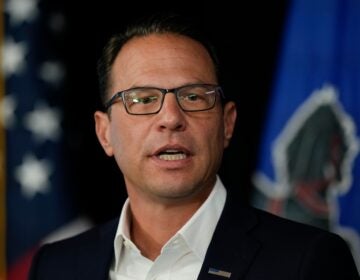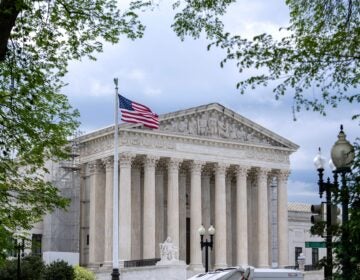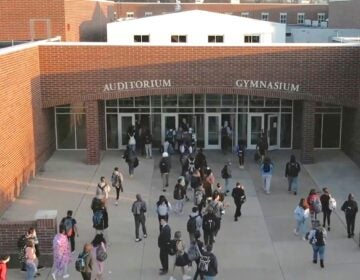Updated: Nutter wants new cigarette tax, liquor tax hike to help fund Philly schools
[Updated at 7:07 p.m.]
Your next debaucherous night of drinking and smoking might help close the Philadelphia School District’s enormous budget gap.
Philadelphia Mayor Michael Nutter is proposing to hike the liquor-by-the-drink tax and create a brand-new $2 tax on every pack of cigarettes in order to help fund the schools.
The School District is seeking money from the city and the state, as well as labor concessions, to close a projected $304 million deficit next fiscal year.
Under Nutter’s plan, the tax on Philly bar tabs would rise to 15 percent from 10 percent. Nutter is also vowing to raise an additional $28 million next fiscal year by doing a better job collecting taxes currently owed to the School District.
Nutter’s three-pronged approach is expected to raise an extra $95 million in city tax revenue, which is more than the $60 million requested by school officials.
If the schools don’t get more money, Nutter argues there will be dire consequences.
“Our young people will suffer under a devastating, bare-bones budget,” he said. “And we will all suffer as a result: poverty, unemployment, crime, lost wages and lack of personal opportunity.”
Nutter dismissed the notion that a new cigarette tax might hurt businesses.
“I don’t know that someone is necessarily going to flee to the suburbs to get a pack of cigarettes,” he said.
The tax would also generate $1 million next fiscal year for a smoking cessation program.
To make his plan a reality, Nutter needs state-enabling legislation and support from City Council.
Nutter’s aides said the state Senate is expected to introduce legislation soon that would allow the city to create a cigarette tax and raise the drink tax. State Sen. Anthony Hardy Williams is optimistic that lawmakers will support those proposals, along with Nutter’s plan to collect more back taxes.
“For those who question whether it’s achievable,” Williams said, “all three are home runs in Harrisburg.”
But that it is in no way guaranteed. Neither is City Council’s support.
City Council President Darrell Clarke is concerned that state officials might authorize the tax hikes, and then think Harrisburg doesn’t have to provide any money directly.
“At the end of the day, there continues to be this underlying issue, the ‘gorilla in the room,'” he said. “Where are the additional dollars that will come from the state of Pennsylvania?”
Councilman James Kenney doesn’t believe imposing a new $2-per-pack tax on cigarettes will be done quickly or easily.
“I’m not a fan of the cigarette industry, but I know, like all industries that have large amounts of lobbyists and a keen interest in not being taxed anymore, I suspect, they are going to fight it,” he said.
In past years, Nutter proposed a new soda tax to raise money for the schools. But after being lobbied aggressively by the soda industry, Council crushed that idea like it was an aluminum can.
Melissa Bova, government affairs representative for the Pennsylvania Restaurant and Lodging Association, said her group is fighting the drink tax increase.
“It’s a 15 percent tax where Montgomery, Chester, Bucks County have a zero percent drink tax,” she said. “So if you want to open up a business, are you going to look at Philadelphia and think that’s a good place to make that kind of investment? With a 15 percent drink tax, I’m not sure.”
Joe Grace, public policy director of the Greater Philadelphia Chamber of Commerce, said he supports Nutter’s plan to collect more delinquent taxes. But he had less to say about the proposed tax increases.
“I don’t think I want to get into the specifics of any particular tax proposal,” he said. “I can say that we support the mayor’s commitment to putting more revenues on the table and to seeking support in Harrisburg. And we want to see the schools in Philadelphia succeed.”
School District officials are also asking for an additional $120 million from Harrisburg and $133 million in labor concessions in order to shore up their budget.
Philadelphia Federation of Teachers president Jerry Jordan did not give any indication that he’s willing to offer givebacks.
“The responsibility for budgeting, or for spending, that did not start with PFT members,” he said. “They chose to [overspend], and so to come and ask us now to bear the brunt of taking pay cuts in order to balance the budget, that’s just wrong.”
Some legislators and administration officials have said that the state wants a “reformed” teachers contract as a condition for any additional state contribution.
Nutter, who said he had spent Monday and part of Tuesday in Harrisburg, said that this is “one of the issues that has come up. The contract doesn’t expire until August 31, and how it gets worked out remains to be seen.”
Councilwoman Maria Quinones-Sanchez has proposed increasing the use and occupancy tax as a way to raise more money for the district, especially from larger businesses whose property taxes, she said, are likely to go down under the new property-tax assessments.
Some advocates said that’s better than the mayor’s plan because it doesn’t require enabling legislation from the state.
Mayoral spokesman Mark McDonald said Nutter “proposed what he wants to do” for the schools, and the administration would discuss its views on the use and occupancy tax when it comes before a Council committee within the next few days.
Shortly after Nutter left the news conference where he announced his plan, he was greeted by parents and children protesting the potential budget cuts. Parent Sarah Bruck said she backs Nutter’s plan.
“That would be great, but we need to see it,” she said. “We’ve been jerked around long enough.”
WHYY/NewsWorks’ Ben Herold and The Notebook’s Dale Mezzacappa contributed to this report.
WHYY is your source for fact-based, in-depth journalism and information. As a nonprofit organization, we rely on financial support from readers like you. Please give today.




